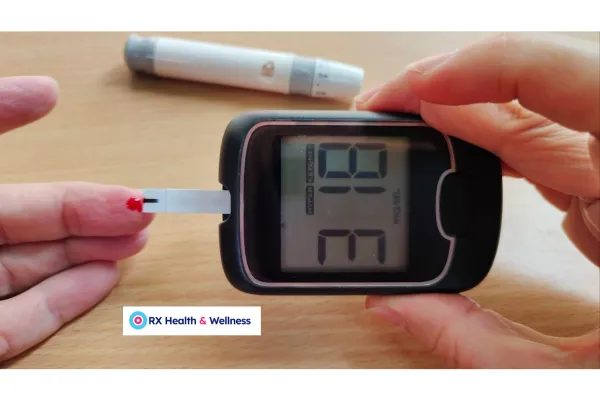
What to Do If You Wake Up with High Fasting Blood Sugars
What to Do If You Wake Up with High Fasting Blood Sugars
Understanding the Causes and Taking Action
Waking up with high blood sugar can feel confusing—especially when you’ve tried to eat well the day before.
This morning number, called fasting blood sugar, is important. It gives clues about your overnight glucose control.
Let’s break down why this happens—and what you can do about it.
Why Morning Blood Sugar Can Be High
Several things can raise fasting blood sugar, including natural hormone patterns, low blood sugar at night, or food choices.
1. Dawn Phenomenon
Your body releases hormones like cortisol and growth hormone between 2–8 AM.
These hormones help you wake up—but they also signal your liver to release stored sugar.
If you have diabetes, your body may not process this sugar well. That’s why your blood sugar is higher in the morning.¹
2. Somogyi Effect (Rebound Highs)
If your blood sugar goes too low during sleep, your body can overcorrect.
It releases stress hormones that raise blood sugar too much by morning.²
This often happens in people who take insulin or certain diabetes medications.
3. Not Enough Evening Medication or Insulin
If your nighttime insulin or medication isn’t strong enough, your blood sugar can slowly rise overnight.
Talk with your doctor if this might be the case.
4. Late-Night Eating
A large or high-carb snack before bed can raise blood sugar all night—especially if digestion is slow while sleeping.
What You Can Do: Step-by-Step
Your approach depends on your type of diabetes. Here’s how to adjust:
If You Have Type 1 Diabetes
✅ Check blood sugar at 2–3 AM. This helps tell if it's the dawn effect or a rebound high.
✅ Use a CGM (if available) for patterns overnight.
✅ Review your long-acting insulin dose with your healthcare provider.
✅ Try a protein-rich bedtime snack if you're prone to nighttime lows.
📖 Reference: DCCT Study (1993)³
If You Have Type 2 Diabetes
✅ Keep a blood sugar log for several days.
✅ Avoid heavy carbs at night. Choose fiber-rich foods with protein and fat.
✅ Talk to your provider about medication adjustments (like adding basal insulin or a GLP-1).
✅ Take a short walk after dinner. Even 10 minutes can help lower morning blood sugar.
📖 Reference: ADA Standards of Care, 2024⁴
If You Have Type 1.5 Diabetes (LADA)
✅ Track trends closely. Your insulin needs can change over time.
✅ Don’t assume lifestyle is enough. Many people with LADA eventually need insulin.
✅ Work with a provider who understands autoimmune diabetes.
📖 Reference: Naik et al., 2009⁵
If You Have Gestational Diabetes
✅ Try a balanced bedtime snack. Include protein and complex carbs (like Greek yogurt and berries).
✅ Know your fasting goal. Often under 95 mg/dL, but follow your doctor’s advice.
✅ Reduce stress. Pregnancy hormones + stress can worsen blood sugar.
✅ Adjust medications if needed. You may need nighttime insulin.
📖 Reference: ACOG Practice Bulletin No. 190 (2018)⁶
General Tips for Everyone
✅ Go to bed and wake up at the same time each day.
✅ Avoid eating late or having sugary snacks before bed.
✅ Do light movement after dinner (walk, stretch).
✅ Manage stress before bed (deep breathing, journaling, etc).
✅ Stay hydrated—dehydration can spike blood sugar.
✅ Check blood sugar at night if you’re unsure what’s going on.
When to Call Your Doctor
Call your provider if:
🔴 Morning numbers are consistently above 130 mg/dL.
🔴 You have symptoms of low blood sugar at night.
🔴 You’re pregnant and numbers stay high despite changes.
🔴 You’re unsure how to adjust your medications.
⚠️ Never change your dose without medical guidance.
Final Thoughts
High morning blood sugar is common—but you can take control.
The first step is understanding why it’s happening. From there, you and your provider can make a plan.
Whether you have Type 1, Type 2, LADA, or gestational diabetes, small adjustments can make a big difference.
References
Monnier L, Colette C. (2015). Circadian rhythms and diabetes. Diabetes Metab.
Cleveland Clinic. (2023). Somogyi Effect.
DCCT Research Group. (1993). Intensive Diabetes Treatment. N Engl J Med.
American Diabetes Association. (2024). Standards of Care in Diabetes – 2024.
Naik RG et al. (2009). Latent Autoimmune Diabetes in Adults. J Clin Endocrinol Metab.
ACOG (2018). Practice Bulletin 190: Gestational Diabetes.
